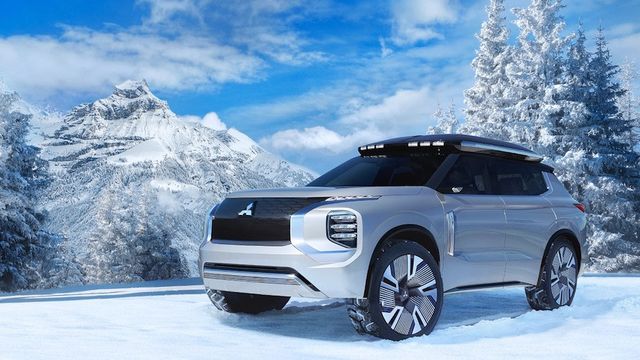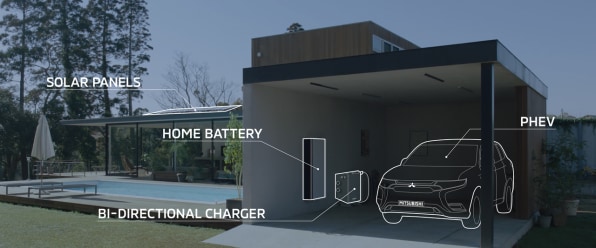This SUV powers your house–and your house powers this SUV

Solar power is remarkable, but it’s unstable. Is it a clear day or did the clouds just roll in? The power is always in flux. That’s why many solar panel owners choose to buy big batteries to store and sip energy all the time. But what if your electric vehicle could also be your home battery? What if your electric car could power your house? Now, it can.
Beginning this year in Japan and Europe, Mitsubishi is going to start selling what it calls the Dendo Drive House. It’s a solar platform, installed by professionals, that includes solar panels, a home battery, and a charger. And this home solar rig is also compatible with Mitsubishi’s electric and hybrid cars, like the newly announced Engleberg Tourer SUV–which is a four-wheel drive plug-in hybrid that can run 43 miles on its battery alone. The promise is that when solar power is plentiful (or even when grid energy is cheaper, like it is in some areas at night), you can charge up both your home and car battery. And when it’s not? If you’d prefer not to buy energy from the electric company–or if you’re just living through a power outage–you can manually drain your car battery as extra backup.
Mitsubishi isn’t the first company to propose this idea. As The Vergepoints out, Elon Musk has flirted with the concept of using Tesla vehicles to power homes in the past. And well before that, the UCLA Smart Grid Research Center proved that energy from inside EVs could be made available to buildings in a matter of seconds.
When I talked to Rajit Gadh, UCLA professor of mechanical and aerospace engineering, about his research in this field back in 2016, he explained to me that, “Now the problem is to scale that from here [at UCLA] to a consumer product, which requires modification of consumer behavior. That takes time.” In 2019, we will have that consumer product. A single system, from a single company, will be able to share power from the sun to the home to the car back to the home.
So will people buy it? There could be a financial incentive. If having this extra vehicle allows you to charge your car when power is cheapest, sure. But, beyond preppers, or people who live off the grid, it’s hard to see a vast amount of daily utility in using your car to power your home. And what happens when you leave to go to work and realize your car battery is drained?

However, at scale, a product like the Dendo Drive House could be world-changing. Currently, the massive amounts of solar energy that flow from private houses onto the grid in states like California can cause sudden spikes or dips, and as a result, we can’t actually take full advantage of the clean energy available to us today. The biggest problem is that electricity must constantly be overproduced to ensure it’s always there when customers might suddenly want just a little bit more than anticipated, which is disastrously wasteful.
When I talked to many experts on the matter of smart electrical grids a few years ago, they made a convincing argument that battery systems, distributed across neighborhoods, homes, and even cars, could make solar both dependable and efficient, especially if individuals were willing to share their battery stores with friends and neighbors on the grid to stop brownouts.
Of course, Mitsubishi can’t get us to that future alone. Many solar companies and car manufacturers would need to take part, convincing people that this is an idea worth investing in. And the energy companies of the world would need to convince those private owners to let a third party siphon energy now and again as needed. No doubt, there are a lot of holes to be filled in such a plan over the coming decades. But it is easy to imagine a future in which every house has solar, and every car on the road actually contributes to a world run by clean energy–rather than battling it.
From: https://www.fastcompany.com/90316119/this-suv-can-power-your-house-and-your-house-can-charge-its-battery

